The Time Machine — EN
X
When the Night Came
“Now, indeed, I seemed in a worse case than before. Hitherto, except during my night’s anguish at the loss of the Time Machine, I had felt a sustaining hope of ultimate escape, but that hope was staggered by these new discoveries. Hitherto I had merely thought myself impeded by the childish simplicity of the little people, and by some unknown forces which I had only to understand to overcome; but there was an altogether new element in the sickening quality of the Morlocks – a something inhuman and malign. Instinctively I loathed them. Before, I had felt as a man might feel who had fallen into a pit: my concern was with the pit and how to get out of it. Now I felt like a beast in a trap, whose enemy would come upon him soon.
“The enemy I dreaded may surprise you. It was the darkness of the new moon. Weena had put this into my head by some at first incomprehensible remarks about the Dark Nights. It was not now such a very difficult problem to guess what the coming Dark Nights might mean. The moon was on the wane: each night there was a longer interval of darkness. And I now understood to some slight degree at least the reason of the fear of the little Upper-world people for the dark. I wondered vaguely what foul villainy it might be that the Morlocks did under the new moon. I felt pretty sure now that my second hypothesis was all wrong. The Upper-world people might once have been the favoured aristocracy, and the Morlocks their mechanical servants: but that had long since passed away. The two species that had resulted from the evolution of man were sliding down towards, or had already arrived at, an altogether new relationship. The Eloi, like the Carolingian kings, had decayed to a mere beautiful futility. They still possessed the earth on sufferance: since the Morlocks, subterranean for generations, had come at last to find the daylit surface. And the Morlocks made their garments, I inferred, and maintained them in their habitual needs, perhaps through the survival of an old habit of service. They did it as a standing horse paws with his foot, or as a man enjoys killing animals in sport: because ancient and departed necessities had impressed it on the organism. But, clearly, the old order was already in part reversed. The Nemesis of the delicate ones was creeping on apace. Ages ago, thousands of generations ago, man had thrust his brother man out of the ease and the sunshine. And now that brother was coming back changed! Already the Eloi had begun to learn one old lesson anew. They were becoming reacquainted with Fear. And suddenly there came into my head the memory of the meat I had seen in the Under-world. It seemed odd how it floated into my mind: not stirred up as it were by the current of my meditations, but coming in almost like a question from outside. I tried to recall the form of it. I had a vague sense of something familiar, but I could not tell what it was at the time.
“Still, however helpless the little people in the presence of their mysterious Fear, I was differently constituted. I came out of this age of ours, this ripe prime of the human race, when Fear does not paralyse and mystery has lost its terrors. I at least would defend myself. Without further delay I determined to make myself arms and a fastness where I might sleep. With that refuge as a base, I could face this strange world with some of that confidence I had lost in realizing to what creatures night by night I lay exposed. I felt I could never sleep again until my bed was secure from them. I shuddered with horror to think how they must already have examined me.
“I wandered during the afternoon along the valley of the Thames, but found nothing that commended itself to my mind as inaccessible. All the buildings and trees seemed easily practicable to such dexterous climbers as the Morlocks, to judge by their wells, must be. Then the tall pinnacles of the Palace of Green Porcelain and the polished gleam of its walls came back to my memory; and in the evening, taking Weena like a child upon my shoulder, I went up the hills towards the south-west. The distance, I had reckoned, was seven or eight miles, but it must have been nearer eighteen. I had first seen the place on a moist afternoon when distances are deceptively diminished. In addition, the heel of one of my shoes was loose, and a nail was working through the sole – they were comfortable old shoes I wore about indoors – so that I was lame. And it was already long past sunset when I came in sight of the palace, silhouetted black against the pale yellow of the sky.
“Weena had been hugely delighted when I began to carry her, but after a while she desired me to let her down, and ran along by the side of me, occasionally darting off on either hand to pick flowers to stick in my pockets. My pockets had always puzzled Weena, but at the last she had concluded that they were an eccentric kind of vase for floral decoration. At least she utilized them for that purpose. And that reminds me! In changing my jacket I found…”
The Time Traveller paused, put his hand into his pocket, and silently placed two withered flowers, not unlike very large white mallows, upon the little table. Then he resumed his narrative.
“As the hush of evening crept over the world and we proceeded over the hill crest towards Wimbledon, Weena grew tired and wanted to return to the house of grey stone. But I pointed out the distant pinnacles of the Palace of Green Porcelain to her, and contrived to make her understand that we were seeking a refuge there from her Fear. You know that great pause that comes upon things before the dusk? Even the breeze stops in the trees. To me there is always an air of expectation about that evening stillness. The sky was clear, remote, and empty save for a few horizontal bars far down in the sunset. Well, that night the expectation took the colour of my fears. In that darkling calm my senses seemed preternaturally sharpened. I fancied I could even feel the hollowness of the ground beneath my feet: could, indeed, almost see through it the Morlocks on their ant-hill going hither and thither and waiting for the dark. In my excitement I fancied that they would receive my invasion of their burrows as a declaration of war. And why had they taken my Time Machine?
“So we went on in the quiet, and the twilight deepened into night. The clear blue of the distance faded, and one star after another came out. The ground grew dim and the trees black. Weena’s fears and her fatigue grew upon her. I took her in my arms and talked to her and caressed her. Then, as the darkness grew deeper, she put her arms round my neck, and, closing her eyes, tightly pressed her face against my shoulder. So we went down a long slope into a valley, and there in the dimness I almost walked into a little river. This I waded, and went up the opposite side of the valley, past a number of sleeping houses, and by a statue – a Faun, or some such figure, minus the head. Here too were acacias. So far I had seen nothing of the Morlocks, but it was yet early in the night, and the darker hours before the old moon rose were still to come.
“From the brow of the next hill I saw a thick wood spreading wide and black before me. I hesitated at this. I could see no end to it, either to the right or the left. Feeling tired – my feet, in particular, were very sore – I carefully lowered Weena from my shoulder as I halted, and sat down upon the turf. I could no longer see the Palace of Green Porcelain, and I was in doubt of my direction. I looked into the thickness of the wood and thought of what it might hide. Under that dense tangle of branches one would be out of sight of the stars. Even were there no other lurking danger – a danger I did not care to let my imagination loose upon – there would still be all the roots to stumble over and the tree-boles to strike against.
“I was very tired, too, after the excitements of the day; so I decided that I would not face it, but would pass the night upon the open hill.
“Weena, I was glad to find, was fast asleep. I carefully wrapped her in my jacket, and sat down beside her to wait for the moonrise. The hill-side was quiet and deserted, but from the black of the wood there came now and then a stir of living things. Above me shone the stars, for the night was very clear. I felt a certain sense of friendly comfort in their twinkling. All the old constellations had gone from the sky, however: that slow movement which is imperceptible in a hundred human lifetimes, had long since rearranged them in unfamiliar groupings. But the Milky Way, it seemed to me, was still the same tattered streamer of star-dust as of yore. Southward (as I judged it) was a very bright red star that was new to me; it was even more splendid than our own green Sirius. And amid all these scintillating points of light one bright planet shone kindly and steadily like the face of an old friend.
“Looking at these stars suddenly dwarfed my own troubles and all the gravities of terrestrial life. I thought of their unfathomable distance, and the slow inevitable drift of their movements out of the unknown past into the unknown future. I thought of the great precessional cycle that the pole of the earth describes. Only forty times had that silent revolution occurred during all the years that I had traversed. And during these few revolutions all the activity, all the traditions, the complex organizations, the nations, languages, literatures, aspirations, even the mere memory of Man as I knew him, had been swept out of existence. Instead were these frail creatures who had forgotten their high ancestry, and the white Things of which I went in terror. Then I thought of the Great Fear that was between the two species, and for the first time, with a sudden shiver, came the clear knowledge of what the meat I had seen might be. Yet it was too horrible! I looked at little Weena sleeping beside me, her face white and starlike under the stars, and forthwith dismissed the thought.
“Through that long night I held my mind off the Morlocks as well as I could, and whiled away the time by trying to fancy I could find signs of the old constellations in the new confusion. The sky kept very clear, except for a hazy cloud or so. No doubt I dozed at times. Then, as my vigil wore on, came a faintness in the eastward sky, like the reflection of some colourless fire, and the old moon rose, thin and peaked and white. And close behind, and overtaking it, and overflowing it, the dawn came, pale at first, and then growing pink and warm. No Morlocks had approached us. Indeed, I had seen none upon the hill that night. And in the confidence of renewed day it almost seemed to me that my fear had been unreasonable. I stood up and found my foot with the loose heel swollen at the ankle and painful under the heel; so I sat down again, took off my shoes, and flung them away.
“I awakened Weena, and we went down into the wood, now green and pleasant instead of black and forbidding. We found some fruit wherewith to break our fast. We soon met others of the dainty ones, laughing and dancing in the sunlight as though there was no such thing in nature as the night. And then I thought once more of the meat that I had seen. I felt assured now of what it was, and from the bottom of my heart I pitied this last feeble rill from the great flood of humanity. Clearly, at some time in the Long-Ago of human decay the Morlocks’ food had run short. Possibly they had lived on rats and such-like vermin. Even now man is far less discriminating and exclusive in his food than he was – far less than any monkey. His prejudice against human flesh is no deep-seated instinct. And so these inhuman sons of men – –! I tried to look at the thing in a scientific spirit. After all, they were less human and more remote than our cannibal ancestors of three or four thousand years ago. And the intelligence that would have made this state of things a torment had gone. Why should I trouble myself? These Eloi were mere fatted cattle, which the ant-like Morlocks preserved and preyed upon – probably saw to the breeding of. And there was Weena dancing at my side!
“Then I tried to preserve myself from the horror that was coming upon me, by regarding it as a rigorous punishment of human selfishness. Man had been content to live in ease and delight upon the labours of his fellow-man, had taken Necessity as his watchword and excuse, and in the fullness of time Necessity had come home to him. I even tried a Carlyle-like scorn of this wretched aristocracy in decay. But this attitude of mind was impossible. However great their intellectual degradation, the Eloi had kept too much of the human form not to claim my sympathy, and to make me perforce a sharer in their degradation and their Fear.
“I had at that time very vague ideas as to the course I should pursue. My first was to secure some safe place of refuge, and to make myself such arms of metal or stone as I could contrive. That necessity was immediate. In the next place, I hoped to procure some means of fire, so that I should have the weapon of a torch at hand, for nothing, I knew, would be more efficient against these Morlocks. Then I wanted to arrange some contrivance to break open the doors of bronze under the White Sphinx. I had in mind a battering-ram. I had a persuasion that if I could enter those doors and carry a blaze of light before me I should discover the Time Machine and escape. I could not imagine the Morlocks were strong enough to move it far away. Weena I had resolved to bring with me to our own time. And turning such schemes over in my mind I pursued our way towards the building which my fancy had chosen as our dwelling.
I seemed in a worse case than before ⇒ The situation in which I was appeared to be worse.
hitherto ˈhɪðəˈtuː adv Until this time.
anguish ˈæŋgwɪʃ n State of mental suffering: pain, misery, distress, agony, affliction
sustaining səsˈteɪnɪŋ v To support the spirits or resolution of: encourage, support, uphold
stagger ˈstægə v To walk or move unsteadily, almost falling over.
impede ɪmˈpiːd v Be a hindrance or obstacle to: hinder, trammel, fetter, entrammel
sickening ˈsɪknɪŋ adj Causing sickness, especially nausea, disgust, or loathing.
malign məˈlaɪn adj Characterized by intense ill will; strongly suggestive of great harm: evil, mean, vicious, nasty, malevolent, malicious; sinister, baleful
loathe ləʊð v To dislike greatly and usually with disgust or intolerance: detest
dread drɛd v To fear something that will or might happen.
to put something into one’s head ⇒ To start thinking about.
incomprehensible ɪnkɒmprɪˈhɛnsəbl adj Impossible or extremely difficult to understand.
the moon is on the wane ⇒ The moon is becoming smaller.
vague veɪg adv In not clearly perceptible manner: faintly, dimly, unclearly
villainy ˈvɪləni Treacherous or vicious act.
Carolingian kings ⇒ The kings of the Carolingian dynasty, very powerful rulers of the Holy Roman Empire at the beginng gradually were displaced in most of the kingdoms of the Empire.
decay dɪˈkeɪ v To be slowly destroyed or broken down by natural processes: rotten
futility fju(ː)ˈtɪlɪti n Uselessness as a consequence of having no practical result: inutility, unusefulness, uselessness
at last ⇒ After a long wait; finally.
garment ˈgɑːmənt n An article of clothing.
infer ɪnˈfɜː v To draw a conclusion from reasoning: conclude, judge, deduce, draw, gather
habitual həˈbɪtjʊəl adj Done or experienced regularly and repeatedly:.
paw pɔː v To strike or scrape with a beating motion.
in sport ⇒ As a joke; for pleasure.
Nemesis ˈnɛmɪsɪs n Greek mythology The goddess of divine retribution and vengeance. Someone’s nemesis is a person or thing that is very difficult for them to defeat.
apace əˈpeɪs adv In a rapid way: quickly, fast
to thrust out ⇒ To push away.
anew əˈnjuː adv Again, once again.
reacquaint ˌriːəˈkweɪnt v Become familiar with something or someone again.
it seems odd ⇒ it seems strange.
to stir up ⇒ To rouse, excite.
to come in ⇒ To appear.
vague veɪg adj Not clearly perceptible: faint, dim, obscure, hazy, misty, bleary, cloudy, unclear
at the time ⇒ At a particular moment in the past; then.
paralyse ˈpærəlaɪz v To cause a person, animal, or part of the body to lose the ability to move or feel.
fastness ˈfɑːstnɪs A strongly fortified and secured defensive structure: stronghold, fortress
shudder ˈʃʌdə v To shiver convulsively: shake, tremble, quiver, quaver
commend kəˈmɛnd v To entrust; deliver with confidence: consign
practicable ˈpræktɪkəbl adj Available for use or capable of being effected, done, or put into practice: accessible, accomplishable, achievable, feasible
dexterous ˈdɛkstərəs adj Showing skill in doing: skillful, deft, masterful, adroit
climber ˈklaɪmə n Someone who climbs mountains for sport.
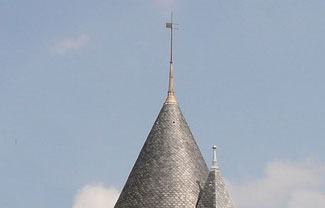 pinnacle ˈpɪnəkl n Small spire on a roof; the highest point: peak, crown
pinnacle ˈpɪnəkl n Small spire on a roof; the highest point: peak, crown
 porcelain ˈpɔːsəlɪn n A hard shiny white substance that is used for making expensive plates, cups etc: china
porcelain ˈpɔːsəlɪn n A hard shiny white substance that is used for making expensive plates, cups etc: china
gleam gliːm n An appearance of reflected light.
reckon ˈrɛkən v To esteem or consider: regard as
seven or eight miles ⇒ 1 mile is 1.609 kilometers. so seven or eight miles are about 11–13 km.
moist mɔɪst adj Slightly wet: damp
deceptive dɪˈsɛptɪv adj Tending to lead into error: misleading, fallacious, delusive
in addition ⇒ as well.
to work through ⇒ To work one’s way.
indoors ˌɪnˈdɔːz adv Within a house or building: inside
lame leɪm adj Disabled or crippled in the legs or feet.
 silhouette ˌsɪlu(ː)ˈɛt v To cause to be seen as an outline that appears dark against a light background.
silhouette ˌsɪlu(ː)ˈɛt v To cause to be seen as an outline that appears dark against a light background.
hugely ˈhjuːʤli adv Extremely, enormously.
to run along by the side of someone ⇒ To run alongside someone
to dart off ⇒ To go away hurriedly.
to stick in ⇒ To insert.
eccentric ɪkˈsɛntrɪk adj Deviating from the customary: strange, unusual, odd, peculiar, quaint, bizarre, queer
vase vɑːz n A container used to put flowers in or for decoration.
wither ˈmæləʊ v To lose freshness: dry up, shrivel
mallow ˈmæləʊ n Plant with hairy stems and leaves and pink or purple flowers.
hush hʌʃ n A silence or calm especially following noise: quiet
Wimbledon ˈwɪmb(ə)ldən ⇒ A district and town of southwest London, England, 7.1 miles (11.4 km) southwest of the centre of London.
contrive kənˈtraɪv v Come up with (an idea, plan, explanation, theory, or principle) after a mental effort: devise, invent
dusk dʌsk n The time of day immediately following sunset.
darkling ˈdɑːklɪŋ adj Uncannily or threateningly dark or obscure.
preternatural ˌpriːtəˈnæʧrəl adj Greatly exceeding the normal course of nature: supernatural, unnatural; abnormal
to go hither and thither ⇒ To go in or to many places; to go here and there.
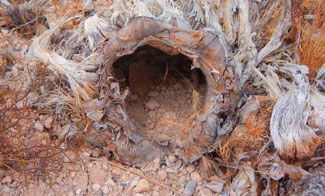 burrow ˈbɜːrəʊ n Hole or tunnel dug in the ground for habitation: hole, den, lair
burrow ˈbɜːrəʊ n Hole or tunnel dug in the ground for habitation: hole, den, lair
twilight ˈtwaɪlaɪt n The time of day immediately following sunset in which the light from the sky is diffused.
caress kəˈrɛs v Touch or stroke lightly in a loving or endearing manner.
wade weɪd v To walk in or through water.
Faun fɔːn n An imaginary creature, half man and half goat.
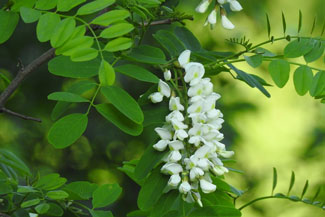 acacia əˈkeɪʃə n Tree or shrub with yellow or white flowers.
acacia əˈkeɪʃə n Tree or shrub with yellow or white flowers.
brow braʊ n The top of a hill.
sore sɔː adj Feeling or affected by pain: painful,pained
halt hɔːlt v To stop: stay, check, cease, arrest
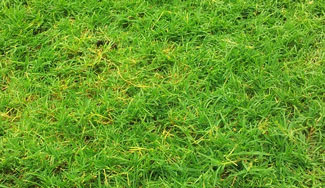 turf tɜːf n Surface layer of earth containing a dense growth of grass and its matted roots: sod
turf tɜːf n Surface layer of earth containing a dense growth of grass and its matted roots: sod
be in doubt of something ⇒ To be uncertain about.
tangle ˈtæŋgl n A twisted and tangled mass that is highly interwoven.
to be out of sight of something ⇒ To go too far away to be seen.
lurk lɜːk v To lie in wait; to move silently and furtively: slip, creep, sneak, prowl
to let loose ⇒ To give rein to.
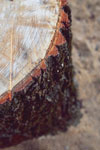 bole bəʊl n The trunk of a tree.
bole bəʊl n The trunk of a tree.
to be fast asleep ⇒ To be in a deep sleep.
twinkle ˈtwɪŋkl v To shine with slight intermittent gleams: flash, glisten, glint, glitter, sparkle
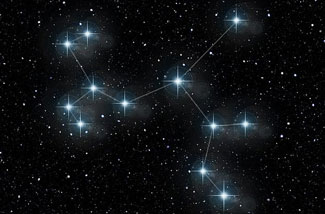 constellation ˌkɒnstəˈleɪʃən n Astronomy An arbitrary formation of stars perceived as a figure or design.
constellation ˌkɒnstəˈleɪʃən n Astronomy An arbitrary formation of stars perceived as a figure or design.
imperceptible ˌɪmpəˈsɛptəbl v Almost impossible to see or notice
grouping ˈgruːpɪŋ n Collection of things united into a group: order, arrangement, formation
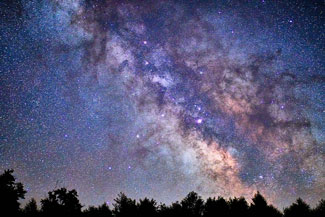 Milky Way ⇒ The galaxy containing the Solar system, visible as a broad band of faint light in the night sky.
Milky Way ⇒ The galaxy containing the Solar system, visible as a broad band of faint light in the night sky.
tattered ˈtætəd adj Worn or with hanging pieces of cloth.
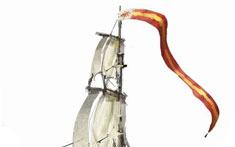 streamer ˈstriːmə n A long narrow wavy strip resembling a banner floating in the wind.
streamer ˈstriːmə n A long narrow wavy strip resembling a banner floating in the wind.
of yore ⇒ long since, long ago.
splendid ˈsplɛndɪd adj Brilliant or fine, esp in appearance: excellent, wonderful, marvellous
Sirius ˈsɪrɪəs ⇒ The brightest star in the night sky, located in the constellation Canis Major
scintillate ˈsɪntɪleɪt v To emit light suddenly in sparks: flash, glisten, gleam, glitter, sparkle, twinkle
dwarf dwɔːf v To cause to appear small by comparison.
gravity ˈgrævɪti n High seriousness: solemnity, somberness
terrestrial life ⇒ Life on Earth; terrestrial tɪˈrɛstrɪəl adj Relating to the earth.
unfathomable ʌnˈfæðəməbl adj Difficult or impossible to measure: boundless, bottomless
precessional prɪˈsɛʃənl adj (Astronomy) Related to the slow gyration of the earth’s rotational axis around the pole of the ecliptic, caused by the gravitational pull of the sun, moon, and other planets on the earth’s equatorial bulge.
traverse ˈtrævə(ː)s v To travel through.
aspiration ˌæspəˈreɪʃ(ə)n n A will to succeed: ambition, goal, intention, aim, aim in life
to sweep out of existence ⇒ To destroy, to exterminate.
frail freɪl adj Physically weak: delicate
ancestry ˈænsɪstri n One’s forrunners: birth, origin, descent, lineage, parentage
shiver ˈʃɪvə v To shake slightly because of cold, fear, etc.
forthwith ˈfɔːθˈwɪθ adv Without delay: now, directly, immediately, at once
to hold one’s mind off something ⇒ To not think about something deliberately.
as well as I can ⇒ As far as I can.
to while away time ⇒ To pass time in a lazy way.
the sky keeps very clear ⇒ The sky remains unclouded.
hazy ˈheɪzi adj Filled or abounding with fog or mist: brumous, foggy, misty
a cloud or so ⇒ A cloud or something similar to that.
dose dəʊs v To sleep lightly and intermittently: nap
vigil ˈvɪʤɪl n Watch kept during normal sleeping hours: watch, vigilance, lookout
to wear on ⇒ To pass slowly or tediously (of time).
overtake ˌəʊvəˈteɪk v To catch up with in traveling or pursuit; draw even with.
swollen ˈswəʊlən adj Expanded by or as if by internal pressure: distended
to fling something away ⇒ To hurl, to throw away.
wherewith to ⇒ with which to.
to break fast ⇒ To interrupt a period of not eating food.
dainty ˈdeɪnti adj Small, pretty, and delicate.
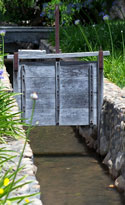 rill rɪl n Small stram or brook: rivulet
rill rɪl n Small stram or brook: rivulet
decay dɪˈkeɪ n Gradual deterioration to an inferior state; a falling into ruin.
to run short ⇒ To become insufficient.
to live on something ⇒ To subsist on.
vermin ˈvɜːmɪn n An animals that prey on game.
prejudice ˈprɛʤʊdɪs n An inclination against something that inhibits impartial judgment: bias, partiality, prepossession
after all ⇒ in spite of all.
cannibal ˈkænɪbəl n A person who eats human flesh.
torment ˈtɔːmənt n Unbearable physical pain: torture
prey preɪ v To eat an animal caught for food.
to see to ⇒ To be attentive; to take care; to give heed.
rigorous ˈrɪgərəs n Imposing a severe test of bodily or spiritual strength: hard, rough, severe, tough, trying, heavy
to live upon the labours of someone ⇒ To live at someone else’s expense.
watchword ˈwɒʧwɜːd n A secret word or phrase known only to a restricted group: password, word, parole
Thomas Carlyle ⇒ (1795 to 1881) A Scottish essayist, satirist, critic, and historian whose works were hugely influential during the Victorian era.
scorn skɔːn n Lack of respect accompanied by a feeling of intense dislike: contempt, disdain, despite
wretched ˈrɛʧɪd adj Characterized by physical misery: miserable
aristocracy in decay ⇒ Aristocracy becoming lower in quality and strength.
degradation ˌdɛgrəˈdeɪʃən n Changing to a lower less respected state.
perforce pəˈfɔːs adv Without one’s willingness to do something; by force of circumstance.
sharer ˈʃeərə n Someone who has or gives or receives a part or a share: partaker
as to ⇒ As refers to.
contrive kənˈtraɪv v Come up with (an idea, plan, explanation, theory, or principle) after a mental effort: devise, invent
procure prəˈkjʊə v To come into possession of: get, obtain, acquire, secure
means of fire ⇒ Materials necessary to make a fire.
torch tɔːʧ n Portable light produced by the flame of a flammable material wound about the end of a stick of wood.
for fɔː conj Because; since.
contrivance kənˈtraɪvəns n A device or control that is very useful for a particular job: gadget, appliance, widget
battering-ram 〈ˈbætərɪŋræm〉 n Device used to batter by forceful impact; batter 〈ˈbætə〉 v To hit heavily and repeatedly with violent blows: beat, hit, pound, strike, thrash
I had a persuasion that ⇒ I was absolutely sure that.
blaze bleɪz n A strong flame that burns brightly: blazing
dwelling ˈdwɛlɪŋ n Housing that someone is living in: home, domicile, abode, habitation, dwelling house